全新版大学英语第二版unit1笔记
- 格式:doc
- 大小:30.50 KB
- 文档页数:4
![全新版大学英语综合教程(第二版)第一册_课文翻译与课后答案[1]](https://uimg.taocdn.com/0f4ac8f7e53a580216fcfecb.webp)
Unit 1 Growing Up为自己而写——拉塞尔·贝克从孩提时代,我还住在贝尔维尔时,我的脑子里就断断续续地转着当作家的念头,但直等到我高中三年级,这一想法才有了实现的可能。
在这之前,我对所有跟英文课沾边的事都感到腻味。
我觉得英文语法枯燥难懂。
我痛恨那些长而乏味的段落写作,老师读着受累,我写着痛苦。
弗利格尔先生接我们的高三英文课时,我就准备着在这门最最单调乏味的课上再熬上沉闷的一年。
弗利格尔先生在学生中以其说话干巴和激励学生无术而出名。
据说他拘谨刻板,完全落后于时代。
我看他有六七十岁了,古板之极。
他戴着古板的毫无装饰的眼镜,微微卷曲的头发剪得笔齐,梳得纹丝不乱。
他身穿古板的套装,领带端端正正地顶着白衬衣的领扣。
他长着古板的尖下巴,古板的直鼻梁,说起话来一本正经,字斟句酌,彬彬有礼,活脱脱一个滑稽的老古董。
我作好准备,打算在弗利格尔先生的班上一无所获地混上一年,不少日子过去了,还真不出所料。
后半学期我们学写随笔小品文。
弗利格尔先生发下一张家庭作业纸,出了不少题目供我们选择。
像"暑假二三事"那样傻乎乎的题目倒是一个也没有,但绝大多数一样乏味。
我把作文题带回家,一直没写,直到要交作业的前一天晚上。
我躺在沙发上,最终不得不面对这一讨厌的功课,便从笔记本里抽出作文题目单粗粗一看。
我的目光落在"吃意大利细面条的艺术"这个题目上。
这个题目在我脑海里唤起了一连串不同寻常的图像。
贝尔维尔之夜的清晰的回忆如潮水一般涌来,当时,我们大家一起围坐在晚餐桌旁——艾伦舅舅、我母亲、查理舅舅、多丽丝、哈尔舅舅——帕特舅妈晚饭做的是意大利细面条。
那时意大利细面条还是很少听说的异国食品。
多丽丝和我都还从来没吃过,在座的大人也是经验不足,没有一个吃起来得心应手的。
艾伦舅舅家诙谐有趣的场景全都重现在我的脑海中,我回想起来,当晚我们笑作一团,争论着该如何地把面条从盘子上送到嘴里才算合乎礼仪。
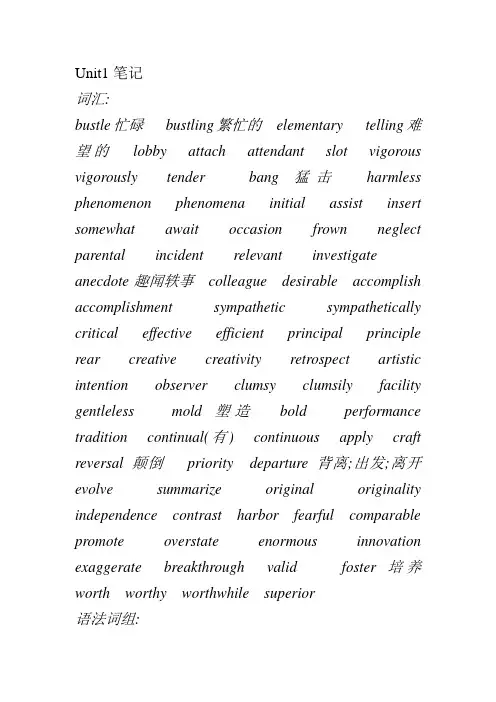
Unit1笔记词汇:bustle忙碌bustling繁忙的elementary telling难望的lobby attach attendant slot vigorous vigorously tender bang猛击harmless phenomenon phenomena initial assist insert somewhat await occasion frown neglect parental incident relevant investigate anecdote趣闻轶事colleague desirable accomplish accomplishment sympathetic sympathetically critical effective efficient principal principle rear creative creativity retrospect artistic intention observer clumsy clumsily facility gentleless mold塑造bold performance tradition continual(有) continuous apply craft reversal颠倒priority departure背离;出发;离开evolve summarize original originality independence contrast harbor fearful comparable promote overstate enormous innovation exaggerate breakthrough valid foster培养worth worthy worthwhile superior语法词组:attach---to---be attached to ---reflect on/upon=think about approach to---the key to---not in the least=not at allfind one’ way 到达,进入,流入make one's way前去;去on occasionon the occasion of---在---之际be relevant to---neglect one’ meals and sleep neglect one’s dutycome over 过来an exception to rules accomplish one’ object/goal accomplish one’ mission完成使命in due coursebe critical to/formake up for---as/so long as 只要succeed in doing---explain-v explanation-non one’ own=by oneselfgood mannersmanner=way=approachin retrospectcome to one’ rescueso much so that---到了这样的程度以至于--- learn from---得知---apply to sb/sth适用于---apply sth to sth把---运用于---apply to do sthapply (to sb) for sthin terms of---evolve into---evolve from/out of---contrast A with/and Bin contrast to---emerge=come out出现emerge from/out of---it emerges that---be superior to/in比---好reliance on=dependence onthrow light onbe worth doing---be worthy to do sthbe worthy of doing---it is worthwhile to do sth句子:The initial talks were the base of the later agreement. the initial letter of a wordHe has long awaited this time.Benjamin was not bothered in the least.His color is not relevant to whether he’s a good lawyer. These facts throw new light on the matter.Road building is a first priority.It later emerges that the driver in the car has been drunk.。
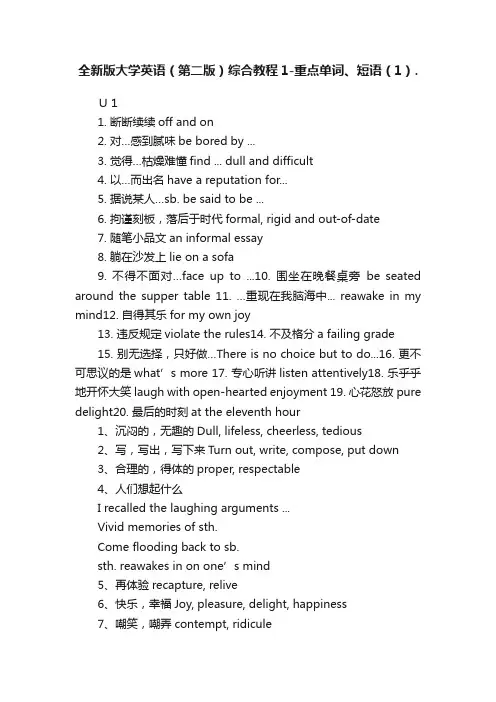
全新版大学英语(第二版)综合教程1-重点单词、短语(1).U11. 断断续续off and on2. 对…感到腻味be bored by ...3. 觉得…枯燥难懂find ... dull and difficult4. 以…而出名have a reputation for...5. 据说某人…sb. be said to be ...6. 拘谨刻板,落后于时代formal, rigid and out-of-date7. 随笔小品文an informal essay8. 躺在沙发上lie on a sofa9. 不得不面对…face up to ...10. 围坐在晚餐桌旁be seated around the supper table 11. …重现在我脑海中... reawake in my mind12. 自得其乐for my own joy13. 违反规定violate the rules14. 不及格分a failing grade15. 别无选择,只好做…There is no choice but to do...16. 更不可思议的是what’s more 17. 专心听讲listen attentively18. 乐乎乎地开怀大笑laugh with open-hearted enjoyment 19. 心花怒放pure delight20. 最后的时刻at the eleventh hour1、沉闷的,无趣的Dull, lifeless, cheerless, tedious2、写,写出,写下来Turn out, write, compose, put down3、合理的,得体的proper, respectable4、人们想起什么I recalled the laughing arguments ...Vivid memories of sth.Come flooding back to sb.sth. reawakes in on one’s mind5、再体验recapture, relive6、快乐,幸福Joy, pleasure, delight, happiness7、嘲笑,嘲弄contempt, ridicule8、话题,题目topic, title1. 我们的经理在想法上是很如此顽固,一成不变的,他从不听从别人的意见。
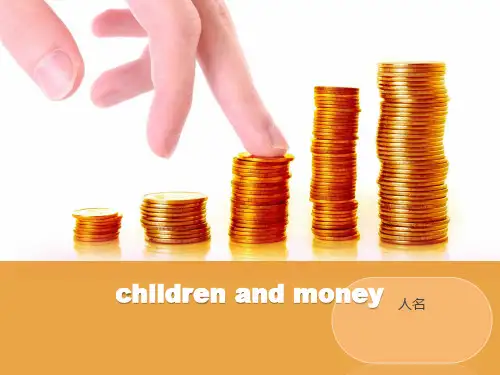

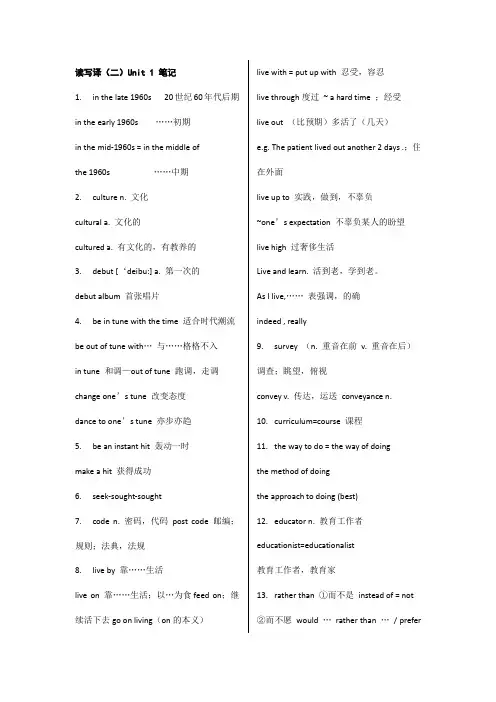
读写译(二)Unit 1 笔记1. in the late 1960s 20世纪60年代后期in the early 1960s ……初期in the mid-1960s = in the middle ofthe 1960s ……中期2. culture n. 文化cultural a. 文化的cultured a. 有文化的,有教养的3. debut [‘deibu:] a. 第一次的debut album 首张唱片4. be in tune with the time 适合时代潮流be out of tune with…与……格格不入in tune 和调—out of tune 跑调,走调change one’s tune 改变态度dance to one’s tune 亦步亦趋5. be an instant hit 轰动一时make a hit 获得成功6. seek-sought-sought7. code n. 密码,代码post code 邮编;规则;法典,法规8. live by 靠……生活live on 靠……生活;以…为食feed on;继续活下去go on living(on的本义)live with = put up with 忍受,容忍live through度过~ a hard time ;经受live out (比预期)多活了(几天)e.g. The patient lived out another 2 days .;住在外面live up to 实践,做到,不辜负~one’s expectation 不辜负某人的盼望live high 过奢侈生活Live and learn. 活到老,学到老。
As I live,……表强调,的确indeed , really9. survey (n. 重音在前v. 重音在后)调查;眺望,俯视convey v. 传达,运送conveyance n.10. curriculum=course 课程11. the way to do = the way of doingthe method of doingthe approach to doing (best)12. educator n. 教育工作者educationist=educationalist教育工作者,教育家13. rather than ①而不是instead of = not②而不愿would …rather than …/ preferto …rather than …other than ①除了except②不同于different frome.g. My idea is quite other than yours.14. kindergarten 幼儿园elementary school = primary school = grammar school = grade school 小学(4)middle school = high school = secondary school 中学(3)junior middle / high school 初中senior middle / high school 高中college / university / institute 大学15. not …but …不是…而是…not that …but that …= not because … but because …16. antenna n. 天线article n. 物品,物件parental a. 父母的注意读音17. attach v. fasten or joinattach sth to sthbe attached to 附属,爱慕e.g. I’m greatly attached to my work .attach importance to ……重视an attached middle school 附属中学attachment n.18. initial a. 一方面的of / at the beginning ;首字母的n. 首字母v. 草签(协议)initiate v. 创始,发动createinitiative n. 积极性have the initiative 掌握积极take the initiative in / by doing 带头做(do sth) on one’s own initiative = actively 积极地19. on occasion 有时= now and then = occasionallyon the occasion of 在……之际e.g. on the occasion of (= at)sb’s wedding / partyon one occasion = once 一次on many occasions 很多次take the occasion to do借此机会(官腔)20. a wedding ring 结婚戒指an engagement ring 订婚戒指21. neglect n.v. 忽视neglect to doneglect one’s meals and sleep废寝忘食beneglectful ofCF: neglect, ignore, omitneglect (心上)对职责,义务的忽视neglect one’s duties 玩忽职守neglect traffic regulations 违反交规ignore (眼上)故意不理睬,置之不理ignorance n. ignorant a.pay attention of = take notice of 注意omit 失误,疏忽,删除22. 以–mit 结尾的动词变为名词变化形式常类似 e.g. permit –permission admit –admission omit –omission 23. not in the least = not at all = not a bit一点也不not a little = very 许多24. relevant a. 有关的,相关relatedbe relevant to 反义irrelevant relevance(cy) n. have relevance to25. case 案件evidence u. proof c. 证据26. investigate vt. vi. investigate into investigator n. 调查员investigation n. on investigation 通过调查under investigation 在调查中make an investigation on / of / into做关于……的调查No investigation , no right to speak .没有调查就没有发言权。
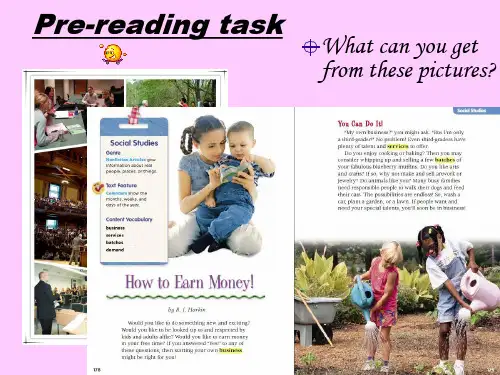
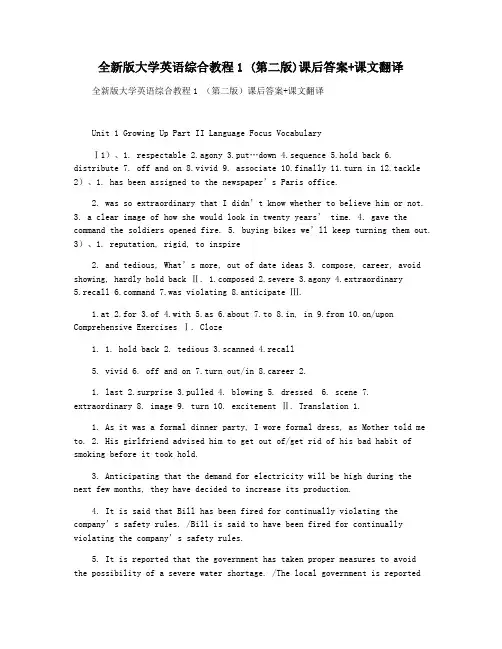
全新版大学英语综合教程1 (第二版)课后答案+课文翻译全新版大学英语综合教程1 (第二版)课后答案+课文翻译Unit 1 Growing Up Part II Language Focus VocabularyⅠ1)、1. respectable 2.agony 3.put…down 4.sequence 5.hold back 6. distribute 7. off and on 8.vivid 9. associate 10.finally 11.turn in 12.tackle 2)、1. has been assigned to the newspaper’s Paris office.2. was so extraordinary that I didn’t know whethe r to believe him or not.3. a clear image of how she would look in twenty years’ time.4. gave the command the soldiers opened fire.5. buying bikes we’ll keep turning them out. 3)、1. reputation, rigid, to inspire2. and tedious, What’s more, out of da te ideas3. compose, career, avoid showing, hardly hold back Ⅱ. posed 2.severe 3.agony4.extraordinary5.recallmand7.was violating8.anticipate Ⅲ.1.at2.for3.of4.with5.as6.about7.to8.in, in9.from 10.on/upon Comprehensive Exercises Ⅰ. Cloze1. 1. hold back2. tedious3.scanned4.recall5. vivid6. off and on7.turn out/in8.career 2.1. last2.surprise3.pulled4. blowing5. dressed6. scene7.extraordinary 8. image 9. turn 10. excitement Ⅱ. Translation 1.1. As it was a formal dinner party, I wore formal dress, as Mother told me to.2. His girlfriend advised him to get out of/get rid of his bad habit of smoking before it took hold.3. Anticipating that the demand for electricity will be high during thenext few months, they have decided to increase its production.4. It is said that Bill has been fired for continually violating the company’s safety rules. /Bill is said to have been fired for continually violating the company’s safety rules.5. It is reported that the government has taken proper measures to avoidthe possibility of a severe water shortage. /The local government is reportedto have taken proper measures to avoid the possibility of a severe water shortage. 2.Susan lost her legs because of / in a car accident. For a time, shedidn’t know how to face up to the fact that she would never (be able to) walk again.One day, while scanning (through) some magazines, a true story caught her eye /she was attracted by a true story. It gave a vivid description of how a disabled girlbecame a writer. Greatly inspired, Susan began to feel that she, too, would finally be bale to lead a useful life. Unit2 I. Vocabulary1.. 1) absolutely 2) available 3) every now and then 4) are urging/ urged 5) destination 6) mostly 7) hangs out 8) right away 9) reunion 10) or something 11) estimate 12) going ahead2. Rewriting1) It seemed that his failure in the examination was still on his mind.2) He was completely choked up by the sight of his team losing in thefinal minutes of the game.3) She was so lost in study that she forgot to have dinner.4) Something has come up and I am afraid I won’t be able to accomplish the project on time.5) The cost of equipping the new hospital was estimated at $2 million.3. Complete the sentences.1) were postponed the awful is estimated 2) reference not available an kind of 3) not much of a teacher skips go aheadII. Collocation1. to2. for3.at4.from5.in6.to on7.on8. withIII. Usage1. more or less2.kind of/ sort of3. something4. kind of/ sort of5.more or less6.or somethingComprehensive exercises I. Cloze 1. text-related1) choked up 2) awful 3) practically 4) neighborhood5) correspondence 6) available 7 destination 8) reunion 9) Mostly 10) postponing 11) absolutely2. Theme-related1) how 2) savings 3) embarrassment 4)phone5) interrupted 6) touch 7) envelop 8) signed 9) message 10) neededII. Translation1. Translate the sentences.1) Half an hour had gone by, but the last bus hadn’t come yet. We had to walkhome.2) Mary seems to be very worried about the Chinese exam because she hasn’t learned the texts by heart.3) Since the basketball match has been postponed, we might as well visit the museum.4) He stayed in Australia with his parents all the way through WWⅡ.5) Since I graduated from Nanjing University in 1985, I have kind of lost touch with my classmates.2. Translate the passage.It is not easy to keep in touch with friends far away. This is true in my case. It has been a couple of years since I left my old neighborhood and all the friends there. I have been meaning to write to them but things come up and I just don’t seem to find the time. They are always on my mind, however, and I think I will certainly make an effort to keep up correspondence with them in the future. Unit 3 I Vocabulary 11) brief 2) in terms of 3) cut off 4) tend5) anyway 6)precise 7)in the form of 8) initiative 9) convey 10) in two minds 11) concept 12) grasp 2感谢您的阅读,祝您生活愉快。
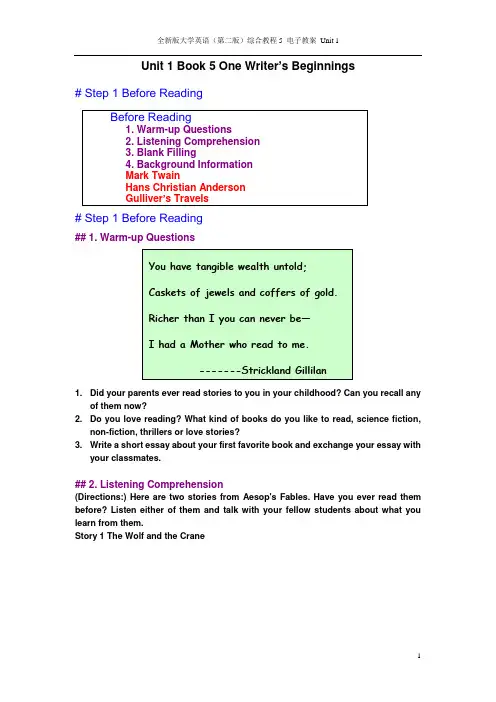
Unit 1 Book 5 One Writer’s Beginnings# Step 1 Before Reading# Step 1 Before Reading## 1. Warm-up Questions1. Did your parents ever read stories to you in your childhood? Can you recall anyof them now?2. Do you love reading? What kind of books do you like to read, science fiction,non-fiction, thrillers or love stories?3. Write a short essay about your first favorite book and exchange your essay withyour classmates.## 2. Listening Comprehension(Directions:) Here are two stories from Aesop's Fables. Have you ever read them before? Listen either of them and talk with your fellow students about what you learn from them.Story 1 The Wolf and the Crane(When a wolf was eating an animal, a small bone from the meat got stuck in his throat. He could not swallow it, so he felt a terrible pain.He ran up and down, and tried to find something to relieve the pain.He tried to convince anyone to remove the bone. "I would give anything," he said, "if you would take it out."At last the crane agreed to try. It told the wolf to open his mouth, and then put its long neck down the wolf's throat.The crane loosened the bone with its beak, and finally got it out."Will you kindly give me the reward?" asked the crane.The wolf showed his teeth, and said, "Be content, you have put your head into a wolf's mouth and taken it out again in safety. That is a great reward for you.")Story 2 The Wolf and the Lamb(Once upon a time a wolf was lapping at a stream. When he looked up, he saw a lamb drinking a little lower down."There's my supper," he thought. "I will find some excuse to catch it." Then he called out to the lamb, "How dare you muddle the water?" "No, master," said the lamb. "I cannot muddle your water because it runs down from you to me.""Well, then," said the wolf. "Why did you call me bad names this time last year?" "It was impossible," said the lamb. "I am only six months old.""I don't care," shouted the wolf. "If it was not you, it must be your father." After that he rushed at the poor little lamb and ate it up.)## 3. Blank Filling(Directions:) Open your textbooks and turn to Page 9, you can see a long list of famous writers, their works and the names of the heroes. Fill in the following blanks with the proper names in the list. The higher your score is, the more you know about western literature.1. In 1806, Noah Webster published his first dictionary. His great dictionary, An American Dictionary of the English Language, appeared in two volumes in 1828. This work included 12,000 words and 40,000 definitions that had never before appeared in a dictionary.2. Mr. Rochester and Jane Eyre fall in love and are about to marry when she discovers that he already has a wife, who is mentally ill. Years later the lovers meet again and marry, although Rochester has by this time been badly injured in a fire.3. Aesop is supposed to have been a freed slave from Thrace. His name became attached to a collection of beast fables long transmitted through oral tradition. The beast fables are part of the common culture of the Indo-European peoples and constitute perhaps the most widely read collection of fables in world literature.4. Robin Hood is a character in traditional British stories. He often wore clothes made of a material called Lincoln green, and held a bow. He robbed rich people and gave money to poor people. There are many stories about him and many films have been made about his adventures.5. Robert Louis Stevenson is best known for his famous children's adventure stories Treasure Island and Kidnapped, but he also wrote poetry for children and the well-known adult psychological novel The Strange Case of Dr Jekyll and Mr. Hyde.##4. Background Information### 1. Mark TwainName at Birth(Samuel Langhorne Clemens)Origin of the Pseudonym(In 1857, Clemens went to New Orleans on his way to make his fortune in South America, but instead he became a Mississippi River pilot—hence his pseudonym, “Mark Twain,” which was the river call for a depth of water of two fathoms. )Chronology of Mark Twain’s Life(1835 Born in Florida, Missouri.1847 Father dies, leaving family in difficult circumstances.1851 Begins work as a journeyman printer with the Hannibal Gazette.Publishes first sketches.1857 Becomes a cub-pilot for Horace Bixby. Spends next two years “learning”the river, later described in Life on the Mississippi.1862 Travels around Nevada and California. Takes job as reporter for the Virginia City Territorial Enterprise.1866 Takes trip to Hawaii as correspondent of the Sacramento Alta Californian. Reports on shipwreck of the Hornet. Gives first publiclecture.1870 Marries Livy in Elmira. Her father buys them a house in Buffalo, New York. Son Langdon is born.1874 Daughter Clara is born. Moves into fanciful Nook Farm house in Hartford.1976 Publishes Tom Sawyer.1884 Publishes The Adventures of Huckleberry Finn in London, American edition comes out the next year. Founds own publishing company,Charles L. Webster & Co.1891 Leaves Hartford to live in Europe because of financial difficulties.1895 Goes on worldwide lecture tour to restore finances.1910 Dies at Stormfield, buried in Elmira.)### 2. Hans Christian AndersonHans Christian Anderson was born in 1805 in Odese, Denmark. His father made shoes and his mother was a washer woman for the wealthy people.In his fairy tales you will find lots of themes showing the differences between the poor and the rich. You will also find the occasional shoemaker.Even as a kid he always loved the arts, and he left home when he was fourteen to make his fortune. He was an artist, a singer and an actor but he was not a success at the star. He grew even poorer and almost died of hunger. He received some money and could afford to continue his education thanks to the person who supported the arts, the director of the royal theater.He went to the university in Copenhagen and began his writing. Here are some of Anderson’s works:The Emperor's New ClothesThe Ugly DucklingThe Princess and the Pea(An emperor hires two tailors who promise to make him a set of remarkable new clothes that will be invisible to anyone who is either incompetent or stupid. When the emperor goes to see his new clothes, he sees nothing at all — for the tailors are swindlers and there aren't any clothes. Afraid of being judgedincompetent or stupid, the emperor pretends to be delighted with the new clothes and “wears” them in a grand parade through the town. Everyone else also pretends to see them, until a child yells out, “He hasn't got any clothes on!”People who point out the emptiness of the pretensions of powerful people and institutions are often compared to the child who says that the emperor has no clothes. )(点击The Ugly Duckling后, 插入图片The Ugly Duckling, 出现以下括号内蓝色字体内容)(The mother's first thought, seeing the odd one in the water, is "He is my own child, and he is not so very ugly after all if you look at him properly." The duckling begins in the farmyard with his family, always the last one to get anything, and always taunted and attacked for his looks, then escapes to the moor among wild ducks, witnesses the carnage among wild geese in the hunting season, escapes from becoming an old woman's pet and is all but frozen into the ice. In the spring, the duckling discovers, from seeing his reflection, that he has grown up to be a beautiful swan — the most beautiful of all birds.The Ugly Duckling has become a metaphor for anything neglected continually, or anything neglected at first, then becoming popular or good. For example: "I can't believe Sara's so accomplished now! She used to be such an ugly duckling.")(点击The Princess and the Pea后, 插入图片The Princess and the Pea, 出现以下括号内蓝色字体内容)(A prince insists on marrying a real princess. When a woman comes to his door maintaining that she is a real princess, the prince's mother tests her by burying a pea under a huge stack of mattresses and then ordering the woman to sleep on the mattresses. The woman cannot sleep and therefore passes the test: being a true princess, she is so delicate that the pea keeps her awake.)### 3. Gulliver’s TravelsAbout the Author(点击About the Author后, 插入图片Swift, 出现以下括号内蓝色字体内容)(Jonathan Swift was born in Dublin, Ireland, on November 30, 1667. His childhood was in some ways unusual. As a year-old baby he was brought to England, while his mother remained in Ireland, and when he was brought back to Ireland a year or two later, his mother returned to England, leaving young Jonathan to be raised by his uncle Godwin Swift. Though his parents were poor, young Jonathan was given the best education that could be had in Ireland. At age fourteen in 1682, young Jonathan entered Trinity College in Dublin. Graduating in 1685, when he was eighteen, Swift obtained his Bachelor of Arts degree. Later he moved to England and started a career in the church. He also discovered his remarkable talent as a satirist and began to write on themes that would stay with him throughout his lifetime---corruption, religion, and education. He became active in politics and was a supporter of the Irish resistance to English oppression while stillbeing a devoted member of the Anglican church. He wrote his masterpiece, Gulliver’s Travels, in 1726. When he died in 1745 at the age of 78 he composed his own epitaph for his gravestone which reads: “He has gone where savage indignation can lacerate his heart no more.”)About the novel(点击About the novel后, 插入图片Gulliver并出现以下括号内蓝色字体内容)(Gulliver in the book goes to sea and time and again gets involved in finding himself in strange lands when his ship sinks or some other tragedy befalls him. The first country is that of the Lilliputs who are only about six inches high. The people he encounters are always very different than he is. Swift uses this as a way of exposing to ridicule and satire the stupidities of our society.)## 1. Part Division of the Text## 2. True or False (这部分没有改动)(Directions:) Decide whether the following statements about the text are true of false.1. Luckily, the author was born in a rich family, so he could own quite a lot books in his childhood. (F)(= The author’s parents could not afford to buy her many books, but they carefully selected and ordered what they thought were good for her.)2. Whenever the author and her parents couldn’t agree with each other, they turned to encyclopedia for help. (T)3. The author loved her books so much that every book was kept in very good conditions. (F)(= Some books handed down from her parents were worn-out.)4. The author was grateful to her parents because they had given her enough books to read. (F)(= To the author, she could never have too many books to read.)5. The author could not really hear the sentences while reading. (T)## 3. Further Understanding (这部分没有改动)For Part 1Table Completion(Directions:) In Para 1, Welty gave a vivid description about how her mother had read to her in different time and different places. Summarize thedifferent settings and complete the table. (鼠标点击表格空格处,答案For Part 2Text Analysis(Directions:) In Part 2, Welty listed a lot of books she read in her childhood. These books are not listed at random but arranged in a certain order. Scanthis part again and try to divide the books into four categories and giveFor Part 3Rearrange the Order of the Sentences(Directions:) Reading had enabled Welty to hear a voice when reading. Welty spenta few sentences in clarifying this silent voice to the readers. Here arethe sentences. Put them into the correct order.1. It is human, but inward, and it is inwardly that I listen to it.2. The cadence, whatever it is that asks you to believe, the feeling that resides in the printed word, reaches me through the reader-voice.3. It is to me the voice of the story or the poem itself.4. It isn’t my mother’s voice, or the voice of any person I can identify, certainly not my own.(Key: 4-1-3-2)# Step 3 Detailed Reading## 1. Difficult Sentences(这部分没有改动)## 1. Difficult Sentences1. (LL. 10~11) …once she granted my wish, but she read off my storybefore I brought her butter.Translate the sentence into Chinese.(=有一次她满足了我的愿望,可是在我把黄油弄好之前,她就读完了故事。
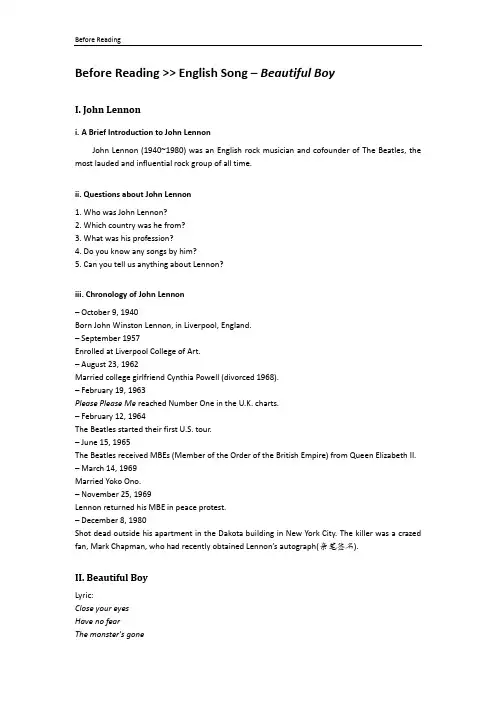
Before Reading >> English Song –Beautiful BoyI. John Lennoni. A Brief Introduction to John LennonJohn Lennon (1940~1980) was an English rock musician and cofounder of The Beatles, the most lauded and influential rock group of all time.ii. Questions about John Lennon1. Who was John Lennon?2. Which country was he from?3. What was his profession?4. Do you know any songs by him?5. Can you tell us anything about Lennon?iii. Chronology of John Lennon– October 9, 1940Born John Winston Lennon, in Liverpool, England.– September 1957Enrolled at Liverpool College of Art.– August 23, 1962Married college girlfriend Cynthia Powell (divorced 1968).– February 19, 1963Please Please Me reached Number One in the U.K. charts.– February 12, 1964The Beatles started their first U.S. tour.– June 15, 1965The Beatles received MBEs (Member of the Order of the British Empire) from Queen Elizabeth II. – March 14, 1969Married Yoko Ono.– November 25, 1969Lennon returned his MBE in peace protest.– December 8, 1980Shot dead outside his apartment in the Dakota building in New York City. The killer was a crazed fan, Mark Chapman, who had recently obtained Lennon’s autograph(亲笔签名).II. Beautiful BoyLyric:Close your eyesHave no fearThe monster's goneHe’s on the run and your daddy's hereBeautiful, beautiful, beautifulBeautiful boyBeautiful, beautiful, beautifulBeautiful boyBefore you go to sleepSay a little prayerEvery day in every wayIt's getting better and betterBeautiful, beautiful, beautifulBeautiful boyBeautiful, beautiful, beautifulBeautiful boyOut of the ocean sailing awayI can hardly waitTo see you come of ageBut I guess we'll both just have to be patient ’Cause it’s a long way to goA had row to howYes it’s a long way to goBut in the meantimeBefore you cross the streetTake my handLife is what happens to youWhile you’re busy making other plansBeautiful, beautiful, beautifulBeautiful boyBeautiful, beautiful, beautifulBeautiful boyBefore you go to sleepSay a little prayerEvery day in every wayIt's getting better and betterBeautiful, beautiful, beautifulBeautiful boyDarling, darling, darlingDarling SeanIII. Questions about the Song and the Texts1. In your opinion, what is the song Beautiful Boy going to tell us?2. What does Lennon think of growing up? Is it easy or full of adventures?3. Can you guess what the texts in this unit are going to be about?Before Reading >> SpaghettiI. DefinitionSpaghetti is the Italian-style thin noodle, cooked by boiling and served with sauce. Unlike some Chinese noodles, it is not served in soup and will never taste pulpy (软乎乎、没有嚼劲的).II. Listen and PracticeRead the words given below and then listen to the passage. After listening to the passage, one student is required to come up and show the right way of eating spaghetti before the class.The Right Way of Eating Spaghetti1. Hold the fork in your hand as if to poke the spaghetti.2. Scoop up a small amount of spaghetti on your fork and raise itabout 30cm above your plate. 3. Make sure the spaghetti on your fork is completely disconnectedfrom the remainder on your plate. 4. Put the prongs of the fork at an edge of the plate that is free offood. 5. Quickly point the prongs of the fork straight down toward theplate and place the points on the plate. 6. Twirl the fork to gather the spaghetti around the prongs.7. With a quick scooping movement, gather up the roll around the prongs and place it in yourmouth.8. Gently gather up any stray spaghetti ends that don’t make it all the way into your mouth.Before Reading >> The American Educational SystemIn the United States, education is the responsibility of individual states, not of the federal government, so requirements may vary from one state to another. The following is a generalization:- kindergarten: under 5 years old- elementary / primary school (grades 1~6): 6~11 years old- junior high / middle school (grades 7~8): 12~13 years old- senior / high school (grades 9~12): 14~17 years old - college, institute, academy (学院), universityGlobal Reading >> ScanningScan Text A and find out all the time words, phrases and clauses.Key:since my childhood in Belleville (Para. 1)until my third year in high school (Para. 1)until then (Para. 1)when our class was assigned to Mr. Fleagle for third-year English (Para. 2)late in the year (Para. 3)until the night before the essay was due (Para. 3)when I finished (Para. 6)next morning (Para. 6)two days passed (Para. 6)when I saw him lift my paper from his desk ... (Para. 6) when Mr. Fleagle finished (Para. 9) Global Reading >> Part Division of the TextGlobal Reading >> Further UnderstandingI. For Part 1 True or False1. Baker had never thought of becoming a writer until he was in the eleventh grade. (F)(As a child in Belleville, he had thought of becoming a writer from time to time.)2. Teachers found it painful to read students’ long and lifeless essays. (T)3. Before Mr. Fleagle became the English teacher for Baker’s class, the English course had been interesting. (F)(From the words “another cheerless year” we can see the English course had been quite boring.)4. In Baker’s opinion, Mr. Fleagle was really a formal, rigid and out-of-date teacher only because of Fleagle’s manner of speaking. (F)(Besides the manner of speaking, Fleagle’s appearance and dress also showed that he was a dull and rigid teacher.)II. For Part 2 Multiple ChoiceChoose the best answer to complete the sentence.1. At first, Baker thought Mr. Fleagle’s English course was ___________. (B)A. interestingB. dullC. hopefulD. attractive2. In Baker’s opinion, the title of the composition “What I Did on My Summer Vacation” was _________. (D)A. dullB. unfruitfulC. difficultD. foolish and dull3. Baker liked to write a com position with the title “The Art of Eating Spaghetti” because __________. (D)A. neither Baker nor Doris had ever eaten spaghetti beforeB. Baker and Doris argued about it at a supperC. spaghetti was from Italy and quite new thenD. it reminded him of the pleasure of that evening4. Which of the following statements is TRUE? _________ (A)A. You’ll not write a good composition until you like the topic.B. When Baker wrote the essay, he thought his teacher would like it.C. Mr. Fleagle had liked Baker’s com positions before.D. Baker succeeded in writing two compositions.III. For Part 3 Questions and Answers1.Do you think Baker would write another essay if he had enough time? Why?2.What was Baker prepared for when he found all the papers had been given back but his?3.Whose essay did Mr. Fleagle read to the class? How did the class respond?4.Which paragraph in this part gives readers the impression that Baker’s essay was very good?5.Why did Baker feel so delighted?Detailed ReadingI. Difficult Sentences1.Until t hen I’d been bored by everything associated with English courses. (Para. 1)What can we infer from this sentence?(Up to then, Baker had had no interest in things related to English courses.)2.I hated the assignments to turn out long, lifeless paragraphs that were agony for teachers to read and for me to write. (Para. 1)Paraphrase the sentence.(I found it painful to write long, boring essays as required by teachers; neither did teachers enjoy what I wrote.)3.another cheerless year in that most tedious of subjects (Para. 2)What can we learn from this phrase?(We can know from this phrase that before Mr. Fleagle became Baker’s English teacher, all English courses were dull.)4.I prepared for an unfruitful year with Mr. Fleagle and for a long time was not disappointed. (Para. 3)What does the author really mean when he says “I ... was not disappointed”?(He means that his expectation was right that Mr. Fleagle’s lessons were dull.)5.I took the list home and did nothing until the night before the essay was due. Lying on the sofa,I finally faced up to the unwelcome task, took the list out of my notebook, and scanned it. (Para. 3)1) What can we infer from these sentences?(Baker was unwilling to write his essay.)2) List phrases to support your inference.(did n othing until … the essay was due; faced up to the unwelcome task.)6.This title produced an extraordinary sequence of mental images. (Para. 4)Paraphrase the sentence and translate it into Chinese.(At the sight of the title I saw an unusual series of pictu res in my mind’s eye.这个题目在我脑海里唤起了一连串不同寻常的图像。
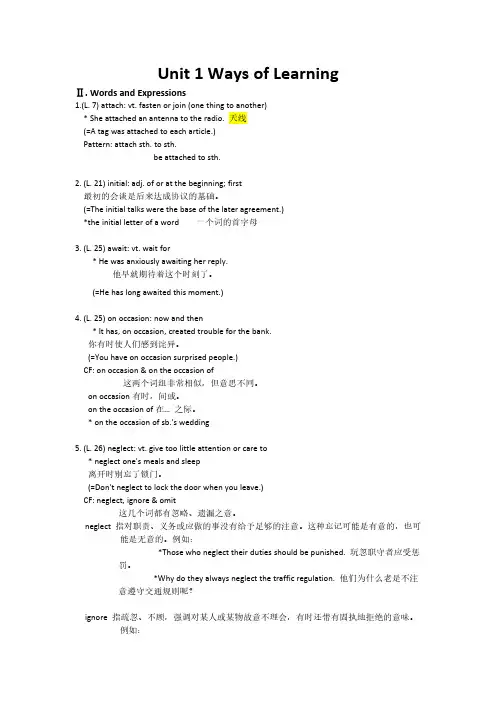
Unit1Ways of LearningⅡ.Words and Expressions1.(L.7)attach:vt.fasten or join(one thing to another)*She attached an antenna to the radio.天线(=A tag was attached to each article.)Pattern:attach sth.to sth.be attached to sth.2.(L.21)initial:adj.of or at the beginning;first最初的会谈是后来达成协议的基础。
(=The initial talks were the base of the later agreement.)*the initial letter of a word一个词的首字母3.(L.25)await:vt.wait for*He was anxiously awaiting her reply.他早就期待着这个时刻了。
(=He has long awaited this moment.)4.(L.25)on occasion:now and then*It has,on occasion,created trouble for the bank.你有时使人们感到诧异。
(=You have on occasion surprised people.)CF:on occasion&on the occasion of这两个词组非常相似,但意思不同。
on occasion有时,间或。
on the occasion of在…之际。
*on the occasion of sb.'s wedding5.(L.26)neglect:vt.give too little attention or care to*neglect one's meals and sleep离开时别忘了锁门。
Detailed ReadingI. Difficult Sentences1.Until then I’d been bored by everything associated with English courses. (Para. 1)What can we infer from this sentence?(Up to then, Baker had had no interest in things related to English courses.)2.I hated the assignments to turn out long, lifeless paragraphs that were agony for teachers to readand for me to write. (Para. 1)Paraphrase the sentence.(I found it painful to write long, boring essays as required by teachers; neither did teachersenjoy what I wrote.)3.another cheerless year in that most tedious of subjects (Para. 2)What can we learn from this phrase?(We can know from this phrase that before Mr. Fleagle became Baker’s English teacher, all English courses were dull.)4.I prepared for an unfruitful year with Mr. Fleagle and for a long time was not disappointed.(Para. 3)What does the author really mean when he says “I ... was not disappointed”?(He means that his expectation was right that Mr. Fleagle’s lessons were dull.)5.I took the list home and did nothing until the night before the essay was due. Lying on the sofa,I finally faced up to the unwelcome task, took the list out of my notebook, and scanned it. (Para.3)1) What can we infer from these sentences?(Baker was unwilling to write his essay.)2) List phrases to support your inference.(did nothing until … the essay was due; faced up to the unwelcome task.)6.This title produced an extraordinary sequence of mental images. (Para. 4)Paraphrase the sentence and translate it into Chinese.(At the sig ht of the title I saw an unusual series of pictures in my mind’s eye.这个题目在我脑海里唤起了一连串不同寻常的图像。
Unit 1 Growing Up为自己而写——拉塞尔·贝克从孩提时代,我还住在贝尔维尔时,我的脑子里就断断续续地转着当作家的念头,但直等到我高中三年级,这一想法才有了实现的可能。
在这之前,我对所有跟英文课沾边的事都感到腻味。
我觉得英文语法枯燥难懂。
我痛恨那些长而乏味的段落写作,老师读着受累,我写着痛苦。
弗利格尔先生接我们的高三英文课时,我就准备着在这门最最单调乏味的课上再熬上沉闷的一年。
弗利格尔先生在学生中以其说话干巴和激励学生无术而出名。
据说他拘谨刻板,完全落后于时代。
我看他有六七十岁了,古板之极。
他戴着古板的毫无装饰的眼镜,微微卷曲的头发剪得笔齐,梳得纹丝不乱。
他身穿古板的套装,领带端端正正地顶着白衬衣的领扣。
他长着古板的尖下巴,古板的直鼻梁,说起话来一本正经,字斟句酌,彬彬有礼,活脱脱一个滑稽的老古董。
我作好准备,打算在弗利格尔先生的班上一无所获地混上一年,不少日子过去了,还真不出所料。
后半学期我们学写随笔小品文。
弗利格尔先生发下一张家庭作业纸,出了不少题目供我们选择。
像"暑假二三事"那样傻乎乎的题目倒是一个也没有,但绝大多数一样乏味。
我把作文题带回家,一直没写,直到要交作业的前一天晚上。
我躺在沙发上,最终不得不面对这一讨厌的功课,便从笔记本里抽出作文题目单粗粗一看。
我的目光落在"吃意大利细面条的艺术"这个题目上。
这个题目在我脑海里唤起了一连串不同寻常的图像。
贝尔维尔之夜的清晰的回忆如潮水一般涌来,当时,我们大家一起围坐在晚餐桌旁——艾伦舅舅、我母亲、查理舅舅、多丽丝、哈尔舅舅——帕特舅妈晚饭做的是意大利细面条。
那时意大利细面条还是很少听说的异国食品。
多丽丝和我都还从来没吃过,在座的大人也是经验不足,没有一个吃起来得心应手的。
艾伦舅舅家诙谐有趣的场景全都重现在我的脑海中,我回想起来,当晚我们笑作一团,争论着该如何地把面条从盘子上送到嘴里才算合乎礼仪。
第一单元1 In 1812, Napoleon Bonaparte, Emperor of the French, led his Grand Army into Russia. He was pre pared for the fierce resistance of the Russian peopl e defending their homeland. He was prepared for the long march across Russian soil to Moscow, the capital city. But he was not prepared for the devast ating enemy that met him in Moscow -- the raw, bi tter, bleak Russian winter.2 In 1941, Adolf Hitler, leader of Nazi Germany, la unched an attack against the Soviet Union, as Russ ia then was called. Hitler's military might was uneq ualed. His war machine had mowed down resista nce in most of Europe. Hitler expected a short cam paign but, like Napoleon before him, was taught a painful lesson. The Russian winter again came to t he aid of the Soviet soldiers.第二单元7 T wo of the most frustrating things about driving a car are getting lost and getting stuck in traffic. While the computer revolution is unlikely to cure t hese problems, it will have a positive impact. Sens ors in your car tuned to radio signals from orbiting satellites can locate your car precisely at any mom ent and warn of traffic jams. We already have twe nty-four Navstar satellites orbiting the earth, maki ng up what is called the Global Positioning System. They make it possible to determine your location on the earth to within about a hundred feet. At an y given time, there are several GPS satellites orbitin g overhead at a distance of about 11,000 miles. Ea ch satellite contains four atomic clocks," which vibr ate at a precise frequency, according to the laws of the quantum theory.8 As a satellite passes overhead, it sends out a ra dio signal that can be detected by a receiver in a ca r's computer. The car's computer can then calculat e how far the satellite is by measuring how long it t ook for the signal to arrive. Since the speed of light is well known, any delay in receiving the satellite's signal can be converted into a distance.第三单元2 When a recent college graduate came into my office not too long ago looking for a sales job, I ask ed him what he had done to prepare for the interv iew. He said he'd read something about us somew here.3 Had he called anyone at Mackay Envelope Cor poration to find out more about us? No. Had he ca lled our suppliers? Our customers? No.4 Had he checked with his university to see if there were any graduates working at Mackay whom h e could interview? Had he asked any friends to grill him in a mock interview? Did he go to the library t o find newspaper clippings on us?5 Did he write a letter beforehand to tell us about himself, what he was doing to prepare for the inte rview and why he'd be right for the job? Was he pl anning to follow up the interview with another lett er indicating his eagerness to join us? Would the le tter be in our hands within 24 hours of the meetin g, possibly even hand-delivered?6 The answer to every question was the same: n o. That left me with only one other question: How well prepared would this person be if he were to c all on a prospective customer for us? I already kne w the answer.第五单元1 For thirty years now I have been studying my f ellowmen. I do not know very much about them. I shrug my shoulders when people tell me that thei r first impressions of a person are always right. I thi nk they must have small insight or great vanity. For my own part I find that the longer I know people t he more they puzzle me.2 These reflections have occurred to me becauseI read in this morning's paper that Edward Hyde B urton had died at Kobe. He was a merchant and he had been in business in Japan for many years. I knew him very little, but he interested me becauseonce he gave me a great surprise. Unless I had heard the story from his own lips, I should never havebelieved that he was capable of such an action. Itwas more startling because both in appearance and manner he suggested a very definite type. Here if ever was a man all of a piece. He was a tiny little fellow, not much more than five feet four in height,and very slender, with white hair, a red face muchwrinkled, and blue eyes. I suppose he was about sixty when I knew him. He was always neatly and quietly dressed in accordance with his age and station.3 Though his offices were in Kobe, Burton often came down to Y okohama. I happened on one occasion to be spending a few days there, waiting for aship, and I was introduced to him at the British Club. We played bridge together. He played a good game and a generous one. He did not talk very much, either then or later when we were having drinks,but what he said was sensible. He had a quiet, dryhumor. He seemed to be popular at the club and afterwards, when he had gone, they described himas one of the best. It happened that we were bothstaying at the Grand Hotel and next day he askedme to dine with him. I met his wife, fat, elderly, and smiling, and his two daughters. It was evidently aunited and affectionate family. I think the chief thing that struck me about Burton was his kindliness.There was something very pleasing in his mild blueeyes. His voice was gentle; you could not imaginethat he could possibly raise it in anger; his smile was benign. Here was a man who attracted you because you felt in him a real love for his fellows. At thesame time he liked his game of cards and his cocktail, he could tell with point a good and spicy story,and in his youth he had been something of an athlete. He was a rich man and he had made every penny himself. I suppose one thing that made you like him was that he was so small and frail; hearoused your instincts of protection. Y ou felt that he could not bear to hurt a fly.第六单元24 As Godbey points out, the stress we feel arisesnot from a shortage of time, but from the surfeit of things we try to cram into it. "It's the kid in the candy store," he says. "There's just so many good things to do. The array of choices is stunning. Our free time is increasing, but not as fast as our sense ofthe necessary."25 A more successful remedy may lie in understanding the problem rather than evading it.26 Before the industrial revolution, people lived in small communities with limited communications. Within the confines of their village, they could reasonably expect to know everything that was to be known, see everything that was to be seen, anddo everything that was to be done.27 T oday, being curious by nature, we are still trying to do the same. But the global village is a worldof limitless possibilities, and we can never achieveour aim.28 It is not more time we need: it is fewer desires. W e need to switch off the cell-phone and leave the children to play by themselves. W e need to buyless, read less and travel less. We need to set boundaries for ourselves, or be doomed to mounting despair.第七单元22.Long before the Boeings brought down the towers, poet Percy Bysshe Shelley wrote "grief returns with the revolving year." So it is with New Y ork.23. The time it took the Earth to circle the sun wastime enough to clear the wreckage, but not enough to fade the memory of what happened there.24. It was time enough to bury the bodies that could be found, but not enough to truly mourn the thousands who perished.25. It was time enough to plan memorials, but notenough to fill the gaping wound in lower Manhattan.26. For what is a year but a thin sliver of history, abeat of a hummingbird's wing?27. And yet, in the space of 12 months, the wounded city rose from its knees, angry Americasmote the T aliban and sent Osama Bin Laden intohiding.28. A new generation of firefighters and cops triedto fill the shoes of those who were lost, a new generation of orphans faced a future uncertain.29. New Y orkers talked tough and carried on, butwith far less swagger and far less joy. They remained haunted by what they had lived through, what they had seen.30. How could they not? Ground Zero is just a subway ride away. Everyone, it seems, knows someone who did not come home Sept. 11. Everyone, it seems, was touched by the tragedy.31. There were indelible images that captured thecarnage like flies in amber — the planes crashing, the towers on fire, the falling men and women frozen in flight as they leaped to their deaths.32. Now the calendar commands us to revisit Sept. 11 Now the calendar commands us to remember the dead. Now the calendar commands us to pick at a scab that has just begun to heal.33. But the calendar does not say how many moretimes the Earth has to revolve around the sun before it stops hurting.。
全新版大学英语2(第二版)U N I T1语言点------------------------------------------作者xxxx------------------------------------------日期xxxxUnit 1 Ways of LearningDetailed Reading for Text A and BThere is no end to learning.学无止境。
I forget what I was taught, I only remember what I have learned.-- Patrick White, British novelist我忘了别人教我的东西,我只记得我自己学的东西。
英国小说家 P. 怀特TEXTAⅠ. Difficult Sentences1. (LL. 13~15) Because of his tender age and incomplete understanding of the need to position the key just so, he would usually fail.Paraphrase the sentence.(= Because he was so young and didn’t quite know that h e should position the key carefully to fit into the narrow key slot, he would usually fail.)2. (L. 15) Benjamin was not bothered in the least.1. Paraphrase the sentence.(= Benjamin was not bothered at all.)2.Translate the sentence into Chinese.(=本杰明一点也不在意。
Unit1笔记
词汇:
bustle忙碌bustling繁忙的elementary telling难望的lobby attach attendant slot vigorous vigorously tender bang猛击harmless phenomenon phenomena initial assist insert somewhat await occasion frown neglect parental incident relevant investigate anecdote趣闻轶事colleague desirable accomplish accomplishment sympathetic sympathetically critical effective efficient principal principle rear creative creativity retrospect artistic intention observer clumsy clumsily facility gentleless mold塑造bold performance tradition continual(有) continuous apply craft reversal颠倒priority departure背离;出发;离开evolve summarize original originality independence contrast harbor fearful comparable promote overstate enormous innovation exaggerate breakthrough valid foster培养worth worthy worthwhile superior
语法词组:
attach---to---
be attached to ---
reflect on/upon=think about approach to---
the key to---
not in the least=not at all
find one’ way 到达,进入,流入make one's way前去;去
on occasion
on the occasion of---在---之际
be relevant to---
neglect one’ meals and sleep neglect one’s duty
come over 过来
an exception to rules accomplish one’ object/goal accomplish one’ mission完成使命in due course
be critical to/for
make up for---
as/so long as 只要
succeed in doing---
explain-v explanation-n
on one’ own=by oneself
good manners
manner=way=approach
in retrospect
come to one’ rescue
so much so that---到了这样的程度以至于--- learn from---得知---
apply to sb/sth适用于---
apply sth to sth把---运用于---
apply to do sth
apply (to sb) for sth
in terms of---
evolve into---
evolve from/out of---
contrast A with/and B
in contrast to---
emerge=come out出现
emerge from/out of---
it emerges that---
be superior to/in比---好
reliance on=dependence on
throw light on
be worth doing---
be worthy to do sth
be worthy of doing---
it is worthwhile to do sth
句子:
The initial talks were the base of the later agreement. the initial letter of a word
He has long awaited this time.
Benjamin was not bothered in the least.
His color is not relevant to whether he’s a good lawyer. These facts throw new light on the matter.
Road building is a first priority.
It later emerges that the driver in the car has been drunk.。